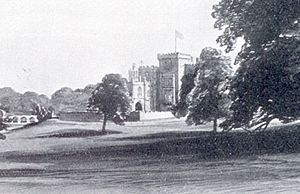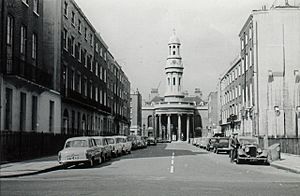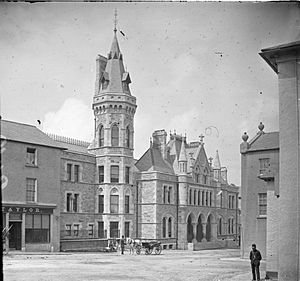Edward Henry Cooper facts for kids

Lieutenant-Colonel Edward Henry Cooper (1827 – 26 February 1902) was an Irish officer in the British Army. He was also a large landowner in County Sligo and a Conservative politician.
When he was 36, Edward Henry Cooper, who was born in Dublin, inherited Markree Castle in County Sligo from his uncle. He then left the army to manage his big country estate. As one of the main landowners in the county, he took on many important local roles. He quickly became a local magistrate (a type of judge). In 1865, he was elected without anyone running against him to the House of Commons of the United Kingdom (the main part of the British Parliament).
Edward Henry Cooper was the sixth person from the Cooper family of Markree to serve as a Member of Parliament (MP) for Sligo. However, he was not very popular as a landlord. This led to him losing his seat in 1868 after serving only one term. After that, he reopened his uncle's Markree Observatory, which was a famous place for studying stars. He also paid for drawings to be made of old historical sites in County Sligo. He served as the Lord Lieutenant of Sligo (a representative of the King or Queen) for 25 years until he died. For the last three years of his life, he was also a Privy Councillor, which was a special advisor role.
Contents
Early Life and Education
Edward Henry Cooper was the oldest of seven children. His father was Richard Wordsworth Cooper, who lived at Longford Lodge in Kingstown (now Dún Laoghaire), County Dublin. Their home later became a school. Edward Henry's grandfather, Edward Synge Cooper, was also an MP and owned Markree Castle. His mother was Emilia Eleanor, whose father was the 1st Viscount Frankfort de Montmorency.
Edward Henry Cooper went to Eton College, a famous school. After finishing school, he joined the British Army in 1845.
Army Career

In May 1845, when he was 18, Cooper bought his way into the army as a cornet (a junior officer rank) in the 7th Light Dragoons. This was a common practice at the time. He was promoted to lieutenant in 1846. Then, he bought another promotion to captain in 1848. He moved to different army units, including the 72nd Foot in 1851 and the Grenadier Guards in 1852.
In 1857, Cooper bought a promotion to lieutenant colonel in the Grenadier Guards. On August 9, 1858, he married Charlotte Maria Mills at St Mary's, Bryanston Square church in London. His uncle, Edward Joshua Cooper, died in April 1863. Since his uncle had five daughters but no sons, Edward Henry inherited Markree Castle. He then retired from the army in July 1863 to take care of his new estate.
Becoming a Politician
After inheriting a huge estate of about 30,000 acres, Cooper was made a magistrate in August 1863. In the 1865 United Kingdom general election, he was chosen as a Conservative candidate for County Sligo. The county already had two Conservative MPs. One of them, Charles William O'Hara, was popular but stepped down due to poor health. So, Cooper was elected without anyone running against him, alongside the other Conservative MP, Sir Robert Gore-Booth.
Edward Henry was the last of six Cooper family members from Markree to hold the MP seat for County Sligo. His family had represented the county in Parliament for many years.
The 1868 Election
The Liberals had not often tried to win seats in County Sligo. However, for the 1868 United Kingdom general election, the Liberals decided to try and win a seat. On July 9, a meeting led by a Catholic Bishop chose Denis Maurice O'Conor as the Liberal candidate. O'Conor was a lawyer and his older brother was already an MP for a nearby county.
On the same day, another meeting was held to support Cooper and Gore-Booth for re-election. With three candidates for two seats, County Sligo had its first election where people actually had to vote in over ten years. Gore-Booth was very popular and expected to win easily. So, the election was mainly a race between Cooper and O'Conor.

The official nomination of candidates happened at the courthouse in Sligo on November 26. O'Conor and Gore-Booth were heard clearly. But when Cooper tried to speak, there was a lot of noise and shouting. He had to stop his speech. People were upset because he had tried to put unpopular rules on his tenants (people who rented land from him).
A local priest who supported O'Conor said that the current MPs were being opposed because they didn't listen to what most people wanted. He also said that Conservatives were elected because landlords forced their tenants to vote for them, not because people voted freely. When people showed their hands, most supported Gore-Booth and O'Conor. But Cooper demanded a full vote.
There was a lot of tension in the county before the election. The newspapers reported that people were very angry with the landlords. The government sent extra police and soldiers to the county to keep order.
Voting took place over three days and finished on December 2. The results showed that O'Conor received the most votes (1671). Gore-Booth came second with 1208 votes. Cooper lost his seat, getting 1129 votes.
After the election, two official complaints were made. One complaint said that Cooper should have won instead of O'Conor, claiming there was bribery and intimidation. Another complaint asked for Gore-Booth's win to be cancelled for similar reasons.
Cooper's loss was the beginning of the end for Conservative landlords representing County Sligo. A new law in 1872 introduced the secret ballot, which meant people could vote in private. This stopped landlords from controlling their tenants' votes. After that, County Sligo never elected a Conservative MP again.
Life After Parliament
Cooper's uncle, Edward Joshua, had built the Markree Observatory on his land. It had a very large telescope. After his uncle died, the observatory was not looked after for a while. In 1874, a man named William Doberck was hired to be its director.
The observatory's main telescope had been left uncovered and was damaged by the Irish weather for 43 years. Doberck oversaw its repair and used it mainly to study double stars. In 1883, Doberck left to work in Hong Kong. He was replaced by Albert Marth, another astronomer. After Marth died in 1897, Frederick William Henckel took over until Cooper's death in 1902.
In 1876, Cooper asked an archaeologist named William Frederick Wakeman to create drawings of old historical sites in County Sligo. These drawings were made between 1886 and 1882 and were even colored with watercolors. They were published in 1893 as two books: "Drawings of the Antiquities of County Sligo" (140 sheets) and "Drawings from the Island of Inishmurray" (80 sheets). Cooper's grandson later gave the original drawings to Sligo County Library in the 1950s.
Cooper also served as the High Sheriff of County Sligo in 1871. Almost ten years after losing his MP seat, Queen Victoria appointed him to the largely ceremonial roles of Lord Lieutenant of Sligo and Custos Rotulorum of Sligo. He held these positions until he died. In 1899, he became a member of the Privy Council of Ireland.
Death
Edward Henry Cooper died on February 26, 1902, after a long illness. He was about 75 years old and passed away at his home in London. His wife had died just four weeks before him.
His oldest son, Major Francis E. Cooper, had died from typhoid in South Africa in 1900. So, Markree Castle was inherited by Francis's oldest son, Bryan Ricco Cooper. Bryan was only 17 years old at the time. He later became an MP for a short time in 1910. In the 1920s, he became one of the few former British MPs to be elected to the Irish Parliament (Dáil Éireann). He sold most of the estate's land and closed the observatory. He even sent the large telescope lens to the Hong Kong Observatory.
|
 | Valerie Thomas |
 | Frederick McKinley Jones |
 | George Edward Alcorn Jr. |
 | Thomas Mensah |

